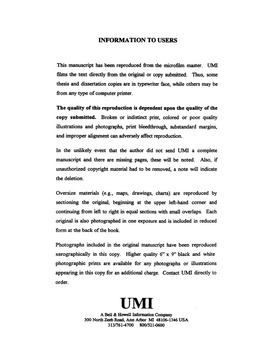| dc.contributor.advisor | Nussbaum, Jon, | en_US |
| dc.contributor.author | Wright, Kevin Bradley. | en_US |
| dc.date.accessioned | 2013-08-16T12:30:27Z | |
| dc.date.available | 2013-08-16T12:30:27Z | |
| dc.date.issued | 1999 | en_US |
| dc.identifier.uri | https://hdl.handle.net/11244/5774 | |
| dc.description.abstract | One hundred and thirty-six older adults using SeniorNet and other related websites were recruited for this study via the Internet. They were asked to complete an on-line questionnaire. Each participant was asked to rate their satisfaction with their on-line support network and their face-to-face support networks, including the degree to which these support networks may have negative as well as positive effects. They also were asked to indicate the degree to which they engaged in companionship activities on the Internet. In addition, they were asked to indicate the type of support they typically give and receive on-line. Finally, they were asked to complete a depression scale and indicate which types of coping strategies they use to overcome problems on a daily basis. | en_US |
| dc.description.abstract | The results indicate that satisfaction with on-line providers of social support was higher than satisfaction with non-Internet providers of support for high Internet users. Low Internet users were more satisfied with their non-Internet support networks. Companionship was found to be a more common activity for the sample than social support between people per se. Greater involvement with the on-line community was found to be negatively correlated with depression. The negative aspects of support for on-line relationships were not found to significantly differ from non-Internet relationships. While social support was not found to be an adequate predictor of the types of coping strategies used, the results indicate that direct action was the most common coping strategy for the sample. Finally, the results also shed light on the nature of computermediated social support for older adults. Most notably, support was found to range from the dissemination of information to extremely intimate sharing of problems and life experiences on-line. | en_US |
| dc.description.abstract | As the number of older adults continues to increase in our society, it is important to understand the variety of ways in which they communicate with each other. One important new context for communication for this population is computer-mediated communication (CMC). While the Internet has become an important resource for information, less is known about the ways in which individuals use this technology for interpersonal communication. While social support has received substantial empirical attention among a variety of academic disciplines, including communication, relatively little is known about the nature and the impact of social support within the computer-mediated communication environment. | en_US |
| dc.description.abstract | Overall, the results revealed that older adults may enjoy many of the benefits of non- Internet social support networks within on-line supportive relationships. In addition, the use of computer-mediated support networks was found to circumvent many of the problems facing older adults, such as geographical distance from family members and other providers of support, the ability to greatly increase the size and quality of their support network, and access to a vast source of information. | en_US |
| dc.description.abstract | The research on social support indicates social support networks can greatly benefit the lives of older adults in terms of helping them to adjust to day-to-day problems, and support has been linked to positive health outcomes, such as lower morbidity and mortality rates. In short, social support may either have a direct impact on a stressful situation faced by an older adult, or it may buffer the effects of stress through elevated mood and a sense of well being within companionship relationships. | en_US |
| dc.format.extent | xii, 140 leaves ; | en_US |
| dc.subject | Older people Communication. | en_US |
| dc.subject | Telematics. | en_US |
| dc.subject | Speech Communication. | en_US |
| dc.subject | Gerontology. | en_US |
| dc.subject | Older people Social networks. | en_US |
| dc.title | Computer-mediated social support, older adults, and coping. | en_US |
| dc.type | Thesis | en_US |
| dc.thesis.degree | Ph.D. | en_US |
| dc.thesis.degreeDiscipline | Department of Communication | en_US |
| dc.note | Source: Dissertation Abstracts International, Volume: 60-01, Section: A, page: 0023. | en_US |
| dc.note | Major Professor: Jon Nussbaum. | en_US |
| ou.identifier | (UMI)AAI9918762 | en_US |
| ou.group | College of Arts and Sciences::Department of Communication | |
